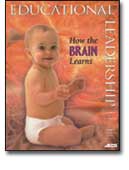The recent explosion of new discoveries in the brain sciences has sparked the publication of many fine books for interested readers, both scientists and nonscientists. I highly recommend the following books, which focus on educationally significant issues in brain research. All have been published since 1996, an important concern in a rapidly moving research field. Perhaps most important, the scientists who wrote them not only participated in the laboratory research they discuss, but also have the ability to effectively explain their discoveries to a wide audience.
Susan Greenfield is unusual—a practicing scientist who writes regularly for the popular press. Her The Human Brain: A Guided Tour (1997) is a fine nontechnical introduction as you begin your journey toward understanding your students' brains.
Development
Three excellent books discuss developmental issues. For decades, Marian Diamond has studied the effects of a social, stimulating environment on a brain's physical development. With Janet Hopson, a noted science writer, Diamond has compiled the research on brain plasticity into a marvelous, practical book for parents and teachers, Magic Trees of the Mind: How to Nurture Your Child's Intelligence, Creativity, and Healthy Emotions from Birth Through Adolescence (1998). It's an excellent mix of clearly explained scientific research and solid advice on how to create stimulating home and school environments.
Stanley Greenspan's The Growth of the Mind and the Endangered Origins of Intelligence (1997) is a thoughtful, practical exploration of the stepwise development of intellect. Its special focus is the emotional interactions between child and caregivers.
Leslie Brothers studies autism. Drawing on her research among those who can't emotionally relate to others, she has written a fascinating book on the neurobiolology, emergence, and nurturance of social behavior, Friday's Footprint: How Society Shapes the Human Mind (1997).
Emotion
Joseph LeDoux, a major researcher in the field of emotion, has focused on fear, perhaps our most important emotion. The Emotional Brain: The Mysterious Underpinnings of Emotional Life (1996) is an excellent introduction to the neurobiology of emotion for anyone interested in the important role that emotion plays in education.
Candace Pert's Molecules of Emotion: Why You Feel the Way You Feel (1997) is a delight. Pert achieved fame with her groundbreaking endorphin-related discoveries. She's had a fascinating career since then; this book is part autobiography about a woman in science and part exploration of her intriguing perspective on the important role that peptides and hormones play in regulating emotion.
Intelligence
Educators have recently become fascinated with the multiple nature of intelligence. The following books will expand your understanding beyond that area of interest. In How Brains Think: Evolving Intelligence, Then and Now (1996), neurophysiologist William Calvin once again demonstrates his ability to lucidly explain complex cognitive concepts, a pattern he established in seven previous books. In this book (and in a more technical companion book, Cerebral Code), he proposes a fascinating theory of the location of intelligence—how our brains are wired to make decisions on the fly. For example, we often begin an extended conversational statement without advance conscious knowledge of the words we'll use to end it.
Whereas Calvin's book addresses the entire field of intelligence, Stanislas Dehaene's The Number Sense: How the Mind Creates Mathematics (1997) is a marvelous exploration of the location and processing systems of one important area of intelligence. In describing the neurobiology of mathematical knowledge and behavior, Dehaene explains such things as why fractions are more difficult to process than whole numbers, why 7 x 9 is more difficult to learn than 3 x 4 even though both are similar simple memory facts, and a whole lot more.
Human Nature
Evolutionary psychology seeks to understand why we humans do the things we do. Two stimulating books give readers an excellent introduction to this important, emerging field. Steven Pinker's How the Mind Works (1997) is an extended and often humorous exploration of the quirks that make us such an interesting species. It's a marvelous book for teachers, full of fascinating insights and stories that will lead to interesting classroom discussions.
Edward Wilson's Consilience: The Unity of Knowledge (1998) is a thought-provoking, somewhat controversial book with profound educational implications. The renowned scientist argues for the unity of all knowledge systems—science, social science, the arts, ethics, religion. He suggests that all are based on a few fundamental natural laws that are deeply grounded in biology.
This list has taken you from a simple nontechnical introduction to our brain to a discussion of the complex issues that are emerging from our increased scientific understanding. Realize that the brain revolution is occurring on our watch. It's essential that the current crop of educators understand the brain (at least functionally) before developing brain-based educational applications. The ten brain scientists in this list are excellent guides. Get acquainted!
